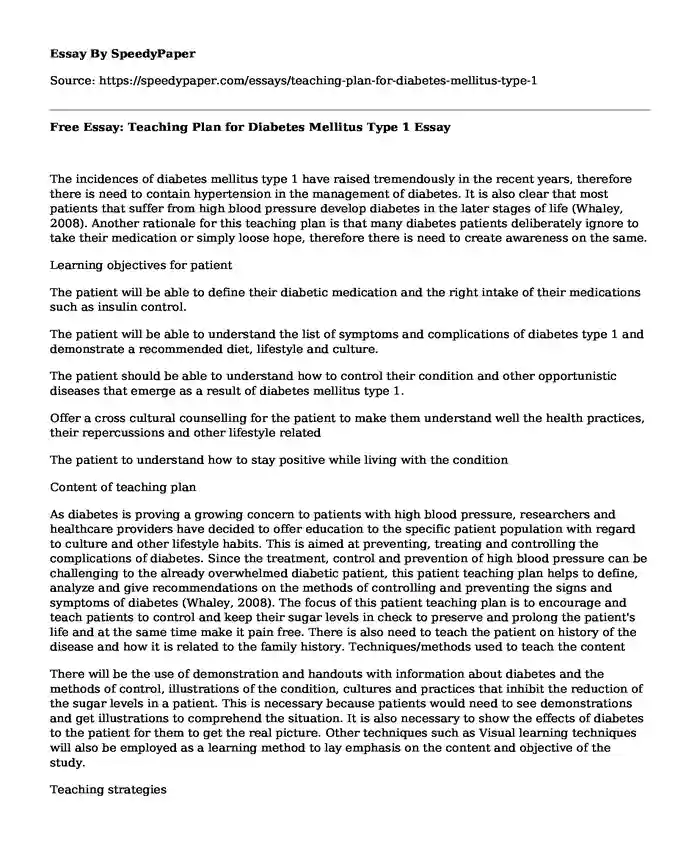The incidences of diabetes mellitus type 1 have raised tremendously in the recent years, therefore there is need to contain hypertension in the management of diabetes. It is also clear that most patients that suffer from high blood pressure develop diabetes in the later stages of life (Whaley, 2008). Another rationale for this teaching plan is that many diabetes patients deliberately ignore to take their medication or simply loose hope, therefore there is need to create awareness on the same.
Learning objectives for patient
The patient will be able to define their diabetic medication and the right intake of their medications such as insulin control.
The patient will be able to understand the list of symptoms and complications of diabetes type 1 and demonstrate a recommended diet, lifestyle and culture.
The patient should be able to understand how to control their condition and other opportunistic diseases that emerge as a result of diabetes mellitus type 1.
Offer a cross cultural counselling for the patient to make them understand well the health practices, their repercussions and other lifestyle related
The patient to understand how to stay positive while living with the condition
Content of teaching plan
As diabetes is proving a growing concern to patients with high blood pressure, researchers and healthcare providers have decided to offer education to the specific patient population with regard to culture and other lifestyle habits. This is aimed at preventing, treating and controlling the complications of diabetes. Since the treatment, control and prevention of high blood pressure can be challenging to the already overwhelmed diabetic patient, this patient teaching plan helps to define, analyze and give recommendations on the methods of controlling and preventing the signs and symptoms of diabetes (Whaley, 2008). The focus of this patient teaching plan is to encourage and teach patients to control and keep their sugar levels in check to preserve and prolong the patient's life and at the same time make it pain free. There is also need to teach the patient on history of the disease and how it is related to the family history. Techniques/methods used to teach the content
There will be the use of demonstration and handouts with information about diabetes and the methods of control, illustrations of the condition, cultures and practices that inhibit the reduction of the sugar levels in a patient. This is necessary because patients would need to see demonstrations and get illustrations to comprehend the situation. It is also necessary to show the effects of diabetes to the patient for them to get the real picture. Other techniques such as Visual learning techniques will also be employed as a learning method to lay emphasis on the content and objective of the study.
Teaching strategies
The patient will be asked to choose their learning preferences, with close assessment of their understanding prowess
Verbal narratives
Reading the printed materials loud to the patient
Involving the family or a relevant group in discussions about the condition
Question and answer format
Teaching materials to consider
The use of pictures, videos, graphs and other visual aids to effect the learning process
Flash cards
Conversation maps
Consultations, referrals
In such a case, additional steps that would be suggested include self-management, management with a diabetes team and self-monitoring of blood sugar to reduce the number of repeat visits to dieticians or doctors. However, in specific incidents, referrals to a diabetes care team for management of the disease are recommended.
References
Gagnayre, R., Traynard, P., d'Ivernois, J., & Slama, G. (2000). An analysis of the teaching techniques used in diabetic specialist consultations. Patient Education and Counseling, 39(2-3), 163-167.
Hess, R. (2006). The Diabetes Patient Portal: Patient Perspectives on Structure and Delivery. Diabetes Spectrum, 19(2), 106-110.
Whaley, A. (2008). Cultural sensitivity and cultural competence: toward clarity of definitions in cross-cultural counselling and psychotherapy. Counselling Psychology Quarterly, 21(3), 215-222.
Cite this page
Free Essay: Teaching Plan for Diabetes Mellitus Type 1. (2022, Mar 01). Retrieved from https://speedypaper.net/essays/teaching-plan-for-diabetes-mellitus-type-1
Request Removal
If you are the original author of this essay and no longer wish to have it published on the SpeedyPaper website, please click below to request its removal:
- Essay Sample on Customization and User Involvement in Innovation
- Free Essay: The Grip of Nature in The Penguin Book of First World War Stories by Korte Barbara
- Free Essay Example on Bureaucracy and Ethics
- Essay Example on Innovativeness in Nursing Intervention and Leadership
- Free Essay Sample with a Discussion on the Worldview
- Paper Sample on the Misuse of Opiate Medication in Non-Cancer Patients
- Religion Essay Sample about Buddhism in South East of Asia before 1200
Popular categories





